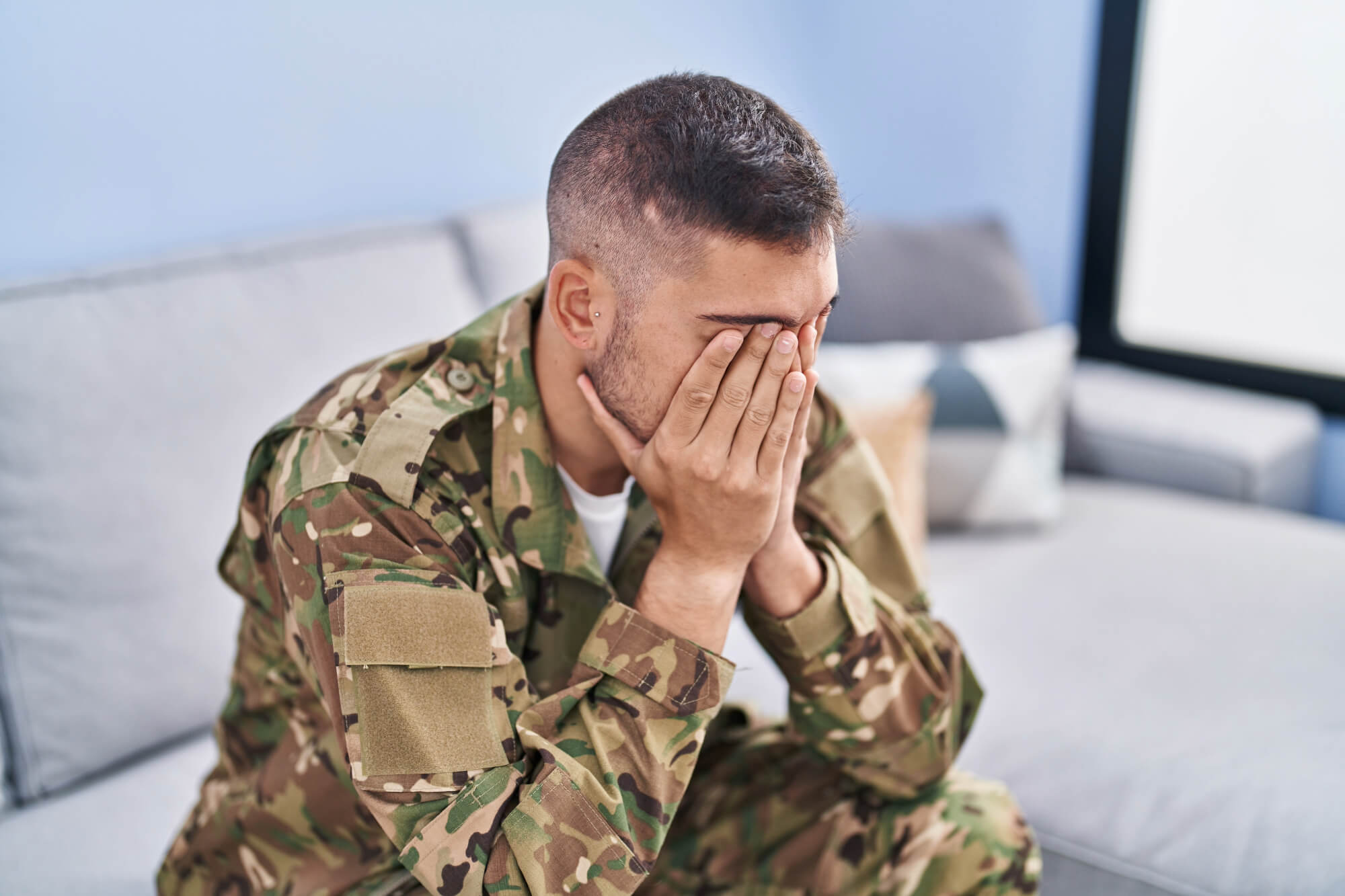Same Day, Weekend, and Evening Appointments Available!

Veteran therapy services provide counseling and mental health care focused on the emotional and psychological effects of military service. Many combat veterans and active duty service members experience traumatic brain injury, emotional distress, chronic pain, or substance abuse as a result of their experiences. Our therapists understand military culture and offer therapy that supports the successful transition to civilian life, using a variety of treatment modalities like talk therapy, cognitive processing therapy, and group counseling. These services are available to qualifying military service members, veterans, and their families.
.webp)
PTSD is one of the most common issues affecting veterans and their families. Exposure to combat, traumatic events, or military sexual trauma can lead to symptoms such as nightmares, flashbacks, and emotional numbness. Our therapy services help veterans work through traumatic stress disorder PTSD with individualized care in a supportive environment.
Many veterans face ongoing feelings of sadness, hopelessness, or fear, often worsened by isolation or difficulty readjusting. Depression and anxiety can interfere with relationships, work, and everyday life. Therapy helps veterans regain emotional balance, build a stronger support system, and improve overall quality of life.
Veterans may turn to alcohol or drugs to cope with traumatic memories, physical pain, or emotional distress. We provide direct support for veterans facing substance abuse by offering coping strategies that encourage long-term recovery and stability.
Strict fitness standards, erratic meal schedules, and limited food options during active duty can lead to disordered eating. Our therapy addresses the relationship between military culture, eating habits, and self-image, helping veterans develop a healthier relationship with food and their bodies.
Traumatic brain injury is a serious concern among combat veterans and active duty service members, often resulting from blasts, accidents, or impact injuries during military service. TBI can lead to ongoing cognitive challenges such as memory loss, mood swings, difficulty concentrating, and emotional instability.
These symptoms may also overlap with other mental health concerns, making diagnosis and treatment more complex. At Louis Laves-Webb, we offer tailored therapy that addresses the psychological effects of brain injury, helping each individual achieve mental clarity and improved quality of life.
Reintegrating into civilian life after military service presents many difficulties. Veterans often feel disconnected from the structure and support they once had. Through readjustment counseling, veterans can explore new routines, identify goals, and build life skills in a safe and compassionate space.
Military life impacts the entire family. Veterans and their spouses may face strained relationships due to long separations, trauma, or emotional distance. We offer family counseling, marriage counseling, and support for veteran spouses to strengthen family connections and promote healing.
Leaving the military can lead to identity challenges and uncertainty about purpose. Therapy helps veterans navigate career changes, manage job training stress, and rediscover meaning and direction in civilian roles.
Exposure to combat can leave lasting psychological wounds. Veterans may experience nightmares, emotional numbness, or intense guilt over events that occurred during service. These trauma responses often resurface unexpectedly, affecting sleep, relationships, and daily functioning.
Sustaining a serious injury or becoming a disabled veteran can profoundly affect identity and emotional well-being. Beyond physical recovery, many veterans struggle with grief, low self-esteem, and a sense of lost purpose. Feelings of isolation or frustration may intensify as they adjust to new limitations.
Military service sometimes places veterans in the path of natural disasters or serious physical injury. The sudden loss of control, threats to survival, or witnessing harm can lead to post-traumatic stress disorder and a persistent sense of vulnerability.
Returning to civilian life can leave veterans feeling isolated from family, friends, and the broader community organizations that don’t understand military culture. This emotional distance often leads to strained communication, detachment, and difficulty maintaining healthy relationships. Veterans may struggle to connect even with their closest family members or feel misunderstood by military families and the greater military community, who had different service experiences.

Survivor’s guilt often manifests as ongoing self-blame, difficulty accepting the loss of fellow soldiers, and an overwhelming sense of unworthiness. These internal struggles can contribute to depression, anxiety, and the use of substances to escape painful emotions.
In addition to survivor’s guilt, moral injury is a deeply personal psychological wound that may arise when veterans witness or participate in actions that violate their core values. Whether it's a battlefield decision or a perceived betrayal from leadership, these moments can disrupt one's belief system and leave lasting emotional scars.
This internal conflict can also spark existential and spiritual questions. Veterans may find themselves questioning the meaning of their survival, their role in the world, or their faith. These unresolved questions can make it hard to connect with others, especially family members or friends who may not fully grasp the depth of the experience.
Women veterans navigate a distinct set of mental health challenges shaped by both military service and gender. While all veterans can struggle with trauma, women service members are disproportionately affected by military sexual trauma (MST), harassment, and systemic neglect. Many face the added burden of being overlooked in veteran spaces and are left to deal with limited community resources, inadequate access to vet center services, and a persistent lack of representation in veteran affairs and peer support networks.
The path to healing is often complicated by societal expectations. Women are frequently expected to resume family and caregiving roles immediately after service, even as they silently cope with post-traumatic stress disorder (PTSD), anxiety, or traumatic brain injury (TBI). These expectations can mask deep emotional distress, making it more difficult for veterans and their families to recognize when support is needed. Feelings of isolation, shame, or invalidation are common, particularly among those who’ve endured sexual assault or felt dismissed by their command or institutions.


Many veterans face internal and external barriers to seeking help for their mental health challenges. These can include stigma, lack of awareness about vet center services, confusion about VA benefits, or mistrust of institutions. Others may worry that seeking care reflects weakness or may negatively affect their service-connected disability claims.
Our therapists are trained to work with veterans in a non-medical setting, offering trauma-informed care that is confidential, culturally competent, and connected to community resources like the military veteran peer network and veterans' assistance programs
Helps veterans manage post-traumatic stress disorder (PTSD) by identifying and reshaping harmful beliefs formed after trauma.
Provides space to explore grief, identity, moral injury, and emotional recovery in a one-on-one setting with a mental health professional.
Strengthens communication and emotional understanding between veterans and their family members, improving trust and long-term relationships.
EMDR Trauma Therapy is a highly effective, non-invasive approach to processing traumatic memories, especially for those with combat-related trauma or military sexual trauma.
Anger management helps veterans develop emotional regulation skills and healthier responses to internal stress and emotional distress.
Men’s therapy creates a dedicated space for male service members to explore identity, role orientation, and mental health concerns shaped by military culture and masculinity.
Veterans within the LGBTQIA+ community may face unique barriers in seeking mental health care. Our LGBTQIA+ affirmative therapy honors identity, encourages emotional exploration, and fosters a safe space for healing.
Internal Family Systems Therapy is a powerful modality for veterans working through compounded childhood trauma, identity fragmentation, and inner conflict, particularly those with traumatic brain injury or complex PTSD.
Focuses on whole-person healing, honoring the connection between physical health, emotional resilience, and psychological recovery.
At Louis Laves-Webb, LCSW, LPC-S & Associates, we serve Central Texas veterans with a nuanced, trauma-informed approach. Our individual and group counseling options provide space to process grief, guilt, anger, and confusion. We also collaborate with local veteran assistance programs, the military veteran peer network, and organizations serving veterans to ensure a comprehensive, community-based support system.

In addition to our therapy services, we guide veterans toward helpful community organizations such as the Austin Vet Center, Veterans Crisis Line, Texas Veterans Commission Fund, and organizations serving veterans. We collaborate with these agencies to ensure veterans and their families have access to referral services, primary health care, vet center services, mortuary services, and more.
Navigating the VA disability process can feel overwhelming, especially when you’re already dealing with the emotional and psychological impacts of military service. At Louis Laves-Webb, LCSW, LPC-S & Associates, we not only offer therapy tailored to the needs of veterans, but we also provide support with veterans' disability paperwork and claims.
Our team understands the complexity of VA documentation and how intimidating the process can be. Whether you’re filing for the first time, appealing a denied claim, or need guidance gathering the necessary materials, we’re here to help.
In a therapeutic setting that’s grounded in empathy and respect, we assist veterans with:
You don’t have to face the system alone. Our goal is to help remove as many barriers as possible so you can focus on healing. We’ll work with you not only in the therapy room, but also behind the scenes, helping to ensure your voice is heard and your experiences are validated throughout the claims process.


At Louis Laves-Webb, LCSW, LPC-S & Associates, we proudly offer veteran therapy in Austin, TX, tailored to the specific needs of veterans and their families. Whether you served in the National Guard, are an active duty service member, or are an eligible veteran seeking support, we’re here to help. Our experienced mental health professionals understand the complexities of military life and provide personalized counseling services that promote growth, resilience, and healing.
From trauma recovery, learning to live with a service-connected disability, to navigating VA benefits or finding the right materials for a successful transition, we’re honored to be part of the veteran community’s healing journey.
You’ve served—now it’s time to be supported. Our Veteran PTSD Therapy includes LGBTQIA+ Affirmative care, creating space for veterans of all identities to heal in a respectful, trauma-informed setting.
Connect with an LGBTQIA+ Affirmative Therapist
Contact us to receive counseling and begin your path to wellness. Let us help you reconnect with your strength, rebuild your life, and feel understood—because every veteran deserves a healthy and compassionate community.